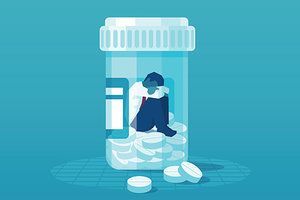It’s a new year and many chiropractors are evaluating what will enhance their respective practices, particularly as it relates to their bottom line. One of the most common questions I get is: “Do I need to be credentialed to bill insurance, and what are the best plans to join?” It’s a loaded question – but one every DC ponders. Whether you're already in-network or pondering whether to join, here's what you need to know.
The Forgotten Epidemic in the Time of COVID-19
In the past month or so, Americans have progressively emerged from the COVID-19 lockdown that dominated headlines. But while we've seen encouragement on the COVID-19 front, and expect more in the months to come, the forgotten epidemic,1 a man-made plague, still thrives ... and may be getting worse.
The Lockdown and Opioid Use
Panic, job loss, financial insecurity, inability to access nondrug health care services for pain, and increased pain caused by any of the above may elevate the risk of opioid use, abuse and addiction. In fact, social isolation itself may increase addiction risk.2 A recent AMA brief3 emphasizes the problem:
The AMA is greatly concerned by an increasing number of reports from national, state and local media suggesting increases in opioid-related mortality — particularly from illicitly manufactured fentanyl and fentanyl analogs. More than 20 states have reported increases in opioid-related mortality as well as ongoing concerns for those with a mental illness or substance use disorder in counties and other areas within the state.
Opioid Abuse and COVID-19

According to the National Institute on Drug Abuse (NIDA), opioid users may also be at higher risk for COVID-19 infection and complications:4
People with opioid use disorder (OUD) ... may also be vulnerable due to those drugs' effects on respiratory and pulmonary health. Additionally, individuals with a substance use disorder are more likely to experience homelessness or incarceration than those in the general population, and these circumstances pose unique challenges regarding transmission of the virus that causes COVID-19.
Advancing the Drug Model
The COVID-19 pandemic has put medication – a vaccine to prevent it and drugs to treat it – into daily conversation. Big Pharma is grinning wider than ever. Discussion of nondrug health care has been sporadic, often drowned out by cries of, "When will a vaccine be ready? and "Do we have a drug that treats it yet?"
The Chiropractic Opportunity
Chiropractors can emerge as the go-to providers in the fight against opioid use and abuse. Per the latest study3:
Patients with spinal pain who saw a chiropractor had half the risk of filling an opioid prescription. Among those who saw a chiropractor within 30�days of diagnosis, the reduction in risk was greater as compared with those with their first visit after the acute phase.
Mother Nature or Big Pharma will eventually bring COVID-19 under control – but the opioid epidemic sees no end in sight. Every DC's voice must ring loud and clear to convey the nondrug message to the masses, especially as COVID-19 takes us in a distinctly drug / vaccine direction. Otherwise, the forgotten epidemic may truly be forgotten until it's too late.
References
- Opioid Overdose: Understanding the Epidemic. Centers for Disease Control and Prevention.
- Grinspoon P. "A Tale of Two Epidemics: When COVID-19 and Opioid Addiction Collide." Harvard Health Blog, April 20, 2020.
- "Issue Brief: Reports of Increases in Opioid-Related Overdose During COVID Pandemic." American Medical Association, Advocacy Resource Center.
- "COVID-19: Potential Implications for Individuals with Substance Use Disorders." NIDA, April 6, 2020.
- Whedon JM, et al. Impact of chiropractic care on use of prescription opioids in patients with spinal pain. Pain Med, 2020 (epub first).



